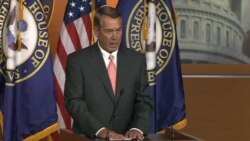ສະມາຊິກສະພາສູງ ຂອງສະຫະລັດ ສັງກັດພັກເດໂທແຄຣັດ
ໄດ້ຂັດຂວາງຕໍ່ ການລົງຄະແນນສຽງບໍ່ເຫັນພ້ອມກັບຂໍ້ຕົກລົງ
ນິວເຄລຍ ກັບອີຣ່ານ ຊຶ່ງເປັນການມອບໄຊຊະນະໃຫ້ແກ່ປະ
ທານາທິບໍດີ Barack Obama ໃນນະໂຍບາຍຕ່າງ ປະເທດ
ທີ່ສຳຄັນສຸດຂອງທ່ານ.
ບັນດາຜູ້ໜະໜັບສະໜູນຕໍ່ຂໍ້ຕົກລົງ ສີ່ສິບສອງຄົນ ໄດ້ລົງຄະແນນສຽງຍັບຢັ້ງການເຄື່ອນ
ໄຫວ ທີ່ຮູ້ກັນວ່າ ການພະຍາຍາມຢຸດການຜ່ານຮ່າງກົດໝາຍຢູ່ໃນສະພາ. ພວກຄັດຄ້ານ
ຕໍ່ຂໍ້ຕົກລົງ ໄດ້ຂາດສອງຄະແນນສຽງຂອງຈຳນວນ 60 ສຽງທີ່ຕ້ອງການ ເພື່ອຍຸຕິການຂັດ
ຂວາງ ແລະດຳເນີນການໄປສູ່ການລົງຄະແນນສຽງຂັ້ນສຸດທ້າຍ ຕໍ່ຮ່າງກົດໝາຍທີ່ບໍ່ເຫັນ
ດີເຫັນພ້ອມນຳ.
ຜູ້ນຳຂອງພັກເດໂມແຄຣັດໃນສະພາສູງ ທ່ານ Harry Reid ໄດ້ກ່າວຫລັງຈາກການລົງ
ຄະແນນສຽງແລ້ວວ່າ “ສະພາສູງ ໄດ້ກ່າວອອກມາດ້ວຍນຳ້ສຽງອັນຈະແຈ້ງ ແລະໄດ້
ປະກາດວ່າ ຂໍ້ຕົກລົງປະຫວັດສາດ ເພື່ອປ້ອງກັນບໍ່ໃຫ້ອີຣ່ານສາ ມາດມີອາວຸດນິວເຄລ
ຢູ່ໃນຄວາມຄອບຄອງນັ້ນ ຈະຍັງຢູ່ຕໍ່ໄປ.”
ປະທານາທິບໍດີ Obama ໄດ້ຖະແຫລງສະບັບນຶ່ງ ຫລັງຈາກການລົງຄະແນນສຽງແລ້ວ
ຮ້ອງການເຄື່ອນໄຫວດັ່ງກ່າວນີ້ວ່າ “ເປັນໄຊຊະນະດ້ານການທູດ ຕໍ່ຄວາມໝັ້ນຄົງແຫ່ງ
ຊາດຂອງອາເມຣິກັນ ແລະເພື່ອຄວາມປອດໄພ ແລະໝັ້ນຄົງຂອງໂລກ.”
ແຕ່ຜູ້ນຳສຽງສ່ວນຫລາຍໃນສະພາສູງຂອງພັກຣີພັບບລີກັນ ທີ່ຜິດຫວັງ ທ່ານ Mitch
McCornell ກ່າວວ່າ “ບັນດາສະມາຊິກສະພາສູງ ພັກເດໂມແຄຣັດ ພຽງແຕ່ລົງຄະແນນ
ສຽງ ເພື່ອກີດກັ້ນບໍ່ໃຫ້ປະຊາຊົນອາເມຣິກັນຈາກການລົງຄະແນນສຽງແທ້ຈິງ ກ່ຽວກັບນຶ່ງ
ໃນບັນຫານະໂຍບາຍຕ່າງປະເທດທີ່ຈະມີຜົນ ຕິດຕາມມາ ໃນຍຸກສະໄໝຂອງພວກເຮົາ.”
ການລົງຄະແນນສຽງ ໄດ້ມີຂຶ້ນບໍ່ເທົ່າໃດມື້ຫລັງຈາກໄດ້ມີການອະພິປາຍຢ່າງເຜັດຮ້ອນ
ກ່ຽວກັບຂໍ້ຕົກລົງນິວເຄລຍນີ້ ແລະລັດຖະສະພາຈະແກ້ໄຂຢ່າງໃດ.
ສະມາຊິກສະພາສູງ ພັກຣີພັບບລິກັນ ທ່ານ Orrin Hatch ກ່າວວ່າ “ມັນບໍ່ທ່າທີແບບນັກ
ລົບ ເທິງຫຼັງມ້າ ກ່ຽວກັບສົງຄາມ ທີ່ນຳຂ້າພະເຈົ້າໄປສູ່ການຄັດ ຄ້ານຕໍ່ຂໍ່ຕົກລົງດັ່ງກ່າວ. ມັນເປັນການຊັ່ງຊາ ຢ່າງແນ່ວແນ່ຂອງຂ້າພະເຈົ້າ ທີ່ວ່າຂໍ້ຕົກລົງນີ້ເຮັດໃຫ້ສົງຄາມມີທ່າ
ທາງທີ່ຈະເກີດຂຶ້ນໄດ້ຫຼາຍກວ່າ.”
ທ່ານ Hatch ກ່າວຕື່ມວ່າ “ບໍ່ຄວນໃຫ້ມີການສົງໄສໃດໆວ່າ ຂໍ້ຕົກລົງນີ້ໄດ້ ແຜ້ວທາງ ແທນທີ່ຈະຂັດຂວາງ ເສັ້ນທາງຂອງອີຣ່ານໄປສູ່ການມີຄວາມສາ ມາດໃນການສ້າງອາ
ວຸດນິວເຄລຍ ຈຶ່ງເຮັດໃຫ້ສົງຄາມມີທ່າທາງວ່າເປັນໄປໄດ້ຫຼາຍຂຶ້ນ.
U.S. Senate Democrats have blocked a vote of disapproval on the nuclear accord with Iran, delivering President Barack Obama a victory on his top foreign policy initiative.
Forty-two supporters of the accord voted to sustain a procedural maneuver known as a filibuster. Opponents of the deal fell two votes shy of the 60 required to end the filibuster and proceed to a final vote on a resolution of disapproval.
"The Senate has spoken with a clarion voice and declared that the historic agreement to prevent Iran from obtaining a nuclear weapon will stand," Senate Democratic leader Harry Reid said moments after the vote.
President Obama, in a statement following the vote, called it "a victory for diplomacy, for American national security, and for the safety and security of the world."
But a disappointed Republican Senate Majority Leader Mitch McConnell said, "Democratic senators just voted to block the American people from even having a real vote on one of the most consequential foreign policy issues of our time."
The vote followed days of impassioned floor debate about the nuclear pact and how Congress should address it.
"It is not a cavalier attitude about war that leads me to oppose this deal," said Republican Senator Orrin Hatch. "It is my unwavering judgment that this deal makes war much more likely."
"Let there be no doubt: a deal that paves, rather than precludes, Iran's path to nuclear weapons capability makes war more likely," Hatch added.
"We have the ability to know if they cheat. If they cheat, we have the ability to put right back in place these crippling economic sanctions," said Democratic Senator Tom Carper. "And if that doesn't do the job, we have other alternatives at our disposal. Nothing is off the table."
Many Democrats stressed that their backing for the accord in no way erodes their support for Israel. Those assertions prompted sharp words from Republican Senator Lindsey Graham.
"If I hear one more comment from my Democratic friends about how much they love Israel - with friends like this, you do not need an enemy," said Graham. "This [agreement] is, over time, a death sentence for Israel."
Graham accused the Obama administration of weakness and capitulation to Tehran.
"The only reason they are not dancing in Iran is the ayatollah just doesn't believe in dancing," Graham quipped.
Many deal backers said the pact is far from perfect, but preferable to any alternatives presented so far.
"That's the basic question here, not is this a good deal or a bad deal," said independent Senator Angus King. "The question is: how does this deal, no matter what its flaws, compare with the alternatives that are out there?"
"And all of the drama and all of the argument, speeches and rallies that we have heard, no one has yet come up with a credible alternative," King added. "The only thing I hear is, We'll reimpose sanctions and bring them back to the table and get a better deal.' It is going to be very hard to reimpose those sanctions without the support of our international partners."
For now, House Republicans have set aside a resolution of disapproval. Facing an internal revolt from conservative members, House Republican leaders are moving forward on a series of alternative measures.
"We'll use every tool at our disposal to stop, slow and delay this agreement from being fully implemented,"said House Speaker John Boehner.
Boehner did not rule out a lawsuit against President Barack Obama for not turning over the texts of side deals between Iran and the IAEA to Congress, saying the 60-day review period of the deal has not actually started.
Even before Thursday's Senate action, the White House was speaking of the accord as a done deal.
"Congress essentially had 60 days to play the spoiler," said White House spokesman Josh Earnest. "Congress' opportunity to play that role will expire next week. That will be good news, and it will mean the international community can move forward with implementing the agreement."
Lawmakers of both parties said the nuclear accord is likely the most important matter to reach Capitol Hill during their time in office.










